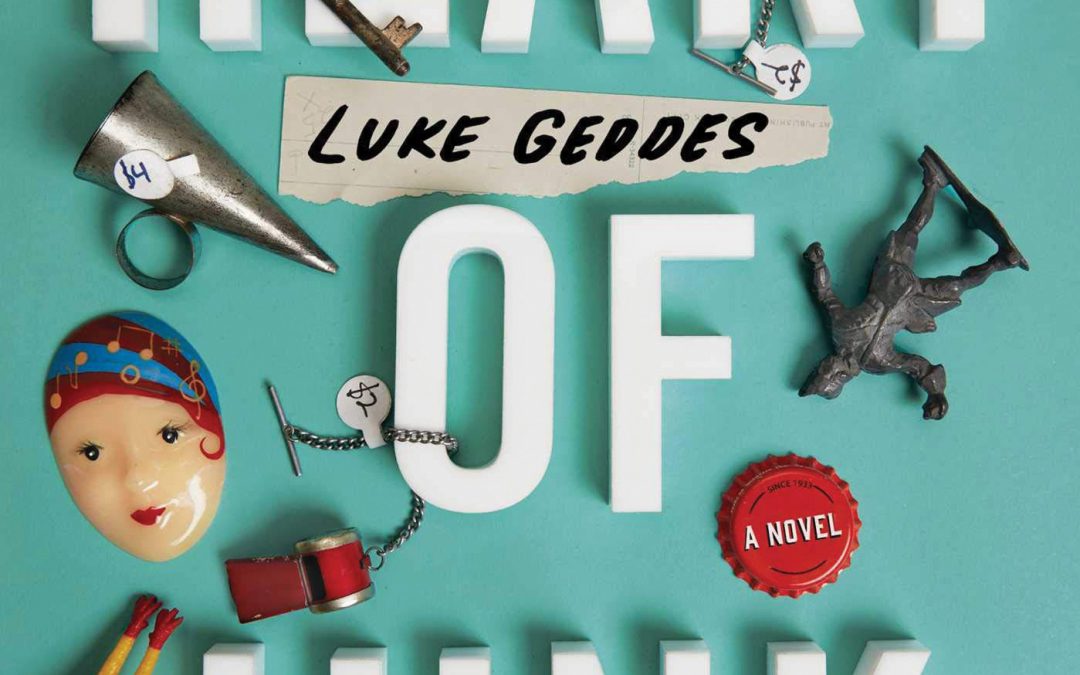By Luke Geddes
In Luke Geddes’ debut novel, The Heart of America is the largest year-round antique mall in Kansas, composed of 189,000 square feet of quality antiques and collectibles. But antique malls in Kansas aren’t doing too well, regardless of how long they’re open, and the increasingly vacant booths spell trouble for the mall’s owners and vendors. Lucky for them, an upcoming visit from a famous television show could be their salvation—as long as a missing beauty queen can be found in time. Heart of Junk is an over-the-top read from start to finish, and while some of its situations are bizarre, there’s plenty of humor and nostalgia to keep you laughing as you wonder what happened to your childhood toys.
A book that takes place largely in a single location has to have a good setting, and Geddes does not disappoint; The Heart of America is a fascinating place, with logically organized halls, strategically placed rest areas, and a decently stocked café. The aisles have kitschy monikers like Bicentennial Boardwalk, Memory Lane and Good Deal Avenue. Of course, it’s really the booths that make the mall: from Delores’ Barbies and Veronica’s mid-century modern furniture to Pete’s toys and Jimmy’s assortment of everything, the collections of the vendors are described with such color and detail that it’s easy to imagine them in all their sparkling, pink, and mish-mashed glory.
The collections say a lot about their owners as well. Each persons’ wares are a reflection of their character: Delores’ obsession with Barbie, the idealized version of a woman, mirrors her longing for perfection; Lee and Seymour’s two separate collections—Lee’s vinyl records in Hall Three and Seymour’s motley collection of comic books, video games and cereal boxes in Hall One—reflect their differing interests, as well as their feeling of growing apart as a couple; and Ronald’s postcards are symbolic of his need for social connections. Although these vendors sound normal enough, they each begin to unravel as the story progresses, growing more and more absurd as Geddes plays upon the characters’ neuroses and poor choices. It works, as this book is a satire—the characters are meant to be ridiculous. While they’re somewhat unbelievable as a result, the vendors all have realistic motivations and goals and there’s a kernel of something recognizable and relatable in each one; whether that be Margaret’s distress over a broken relationship, Ellie’s desire to escape to somewhere new, or Delores’ slow acceptance of herself and her imperfections. The vendors of The Heart of America have realistic motivations and goals, despite being somewhat hidden under their overblown quirks.
Overblown quirky characters obviously need an overblown quirky plot, and Geddes delivers on this, too. Although the initial problem to be solved is the pending foreclosure of The Heart of America, the dealers also become embroiled in the disappearance of Lindy Bobo, a local eight-year-old beauty pageant champion. Geddes walks a fine line here, as his otherwise light-hearted story takes a dark turn where Lindy and her disappearance are concerned, but the situation gives many of the characters an opportunity for growth if not redemption, and provides a nice secondary storyline that directly impacts the fight to save the antique mall.
The story would be more satisfying, however, were the ending not so abrupt. Although a few subplots are wrapped up, many of the characters’ fates are left open-ended, and while it’s not necessary to always tie up every loose end, another chapter or two could’ve provided a better degree of closure. Instead, it seemed a bit like Geddes simply ran out of absurd situations in which to place his characters. That being said, there is a general feeling of optimism for the characters who do get proper endings, each reflective of the changes they’ve undergone as a result of the story’s antics and seemingly with a promise of more normal adventures ahead.
Heart of Junk’s satirical nature—almost cruel at times—and the darker subplot will likely not appeal to everyone, but for those looking for a quick read that explores the concept of one man’s trash being another’s treasure, Luke Geddes’ debut will hit the spot.
Reviewed by Jordan Lynch






